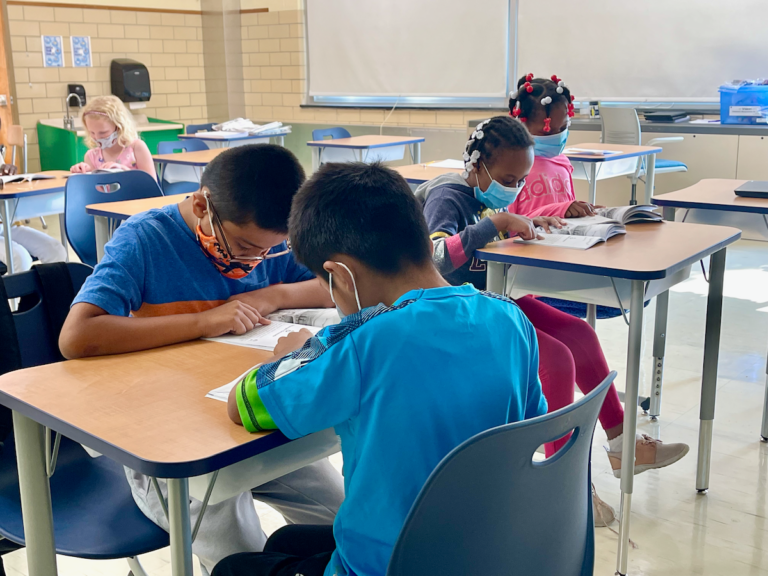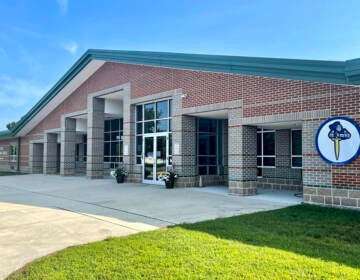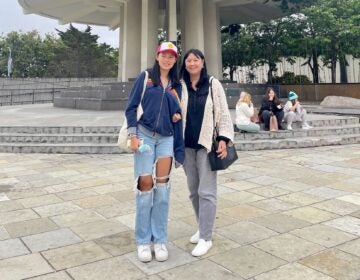Separated by the pandemic, Delaware schools find ways to bridge the communication gap with parents
Schools in southern Delaware turned to bilingual text messaging apps to keep in contact with Spanish- and Creole-speaking parents.

File photo: Students work on assignments during a summer school program. (Johnny Perez-Gonzalez/WHYY)
In-person parent/teacher conferences were impossible during the pandemic, so schools across Sussex County had to find different ways to build relationships with parents. It was especially difficult for English-speaking teachers to connect with a large number of parents who speak Spanish and Haitian Creole.
Some schools added hotlines for parents to call for answers in their own language, while others added a texting app that could translate questions and conversations into English.
North Georgetown Elementary Principal Samantha Lougheed said the bilingual hotline helped many staff members and teachers feel like they had better communication with parents this year than ever before.
“I think what this year did was really bridge the gap even more between our teachers and our families… because there was a lot of responsibility that was put on parents because our children were having to learn half of the week at home,” Lougheed said.
To help families build a better relationship with the school, families would go through an intake process so staff could get to know them personally. Lougheed said that helped staff members provide them with the resources they need.
As the pandemic hit, many families would come to the school and ask for food assistance. North Georgetown Elementary responded at the beginning of the coronavirus with a backpack program that provided sacks of free food every Wednesday.
The school also had partnerships all over the community that made it possible to provide families with clothing.
Over at West Seaford Elementary, teachers started using a text messaging app that can translate English to any language.
Principal Laura Schneider said they used different online platforms like Seesaw, which allowed students to receive their education while allowing parents to be in communication with their teachers in their own language.
Gemma Cabrera, a special education ambassador at North Georgetown Elementary, said with a better-facilitated relationship, parents and guardians are becoming more comfortable in talking to staff members about other issues they’re dealing with.
“We can only help so much,” Cabrera said. “Problems like evictions or problems like finding food or being able to assist with medical care are really kind of beyond our scope of help,” she said.
Cabrera and Lougheed said they try to provide families with as many resources as they can. Cabrera said they understand how other problems can have ramifications that impact a child, but their basic mission is to educate them.
An Indian River School District parent said they are thankful for the support the schools have been giving them.
Celia Gonzalez-Santizo, a Georgetown resident with three students in the Indian River School District said she’s grateful for the support schools have been giving them.
She was one of the parents who received help from the backpack program that provided her a variety of food like juices, milk, cereal, and snacks. She said being able to text message her kids’ teachers has helped develop a closer relationship with them. She knows that if she has a question about her kids’ education, teachers are quick to respond.
“Ahora fue más fácil porque tengo comunicación siempre. ¿Cómo iban en sus estudios? Ellos me mandaban mensaje, como que para mí fue mucho mejor,” Gonzalez-Santizo said. “Si uno necesita saber algo de nuestros hijos, manda uno el mensaje y nos contesta.”
“Now, it was easier because I always have communication. How were they doing in their studies? They were sending me messages, so it was much better for me,” Gonzalez-Santizo said. “If one needs to know something about our children, one sends the message and they respond.”
She’s hopeful that the new lines of communication, especially the text messaging method, stay in place even after the pandemic is over.
This article was produced with the support of a grant from the Delaware Community Foundation. For more information visit https://www.delcf.org/journalism/

Get daily updates from WHYY News!
WHYY is your source for fact-based, in-depth journalism and information. As a nonprofit organization, we rely on financial support from readers like you. Please give today.







